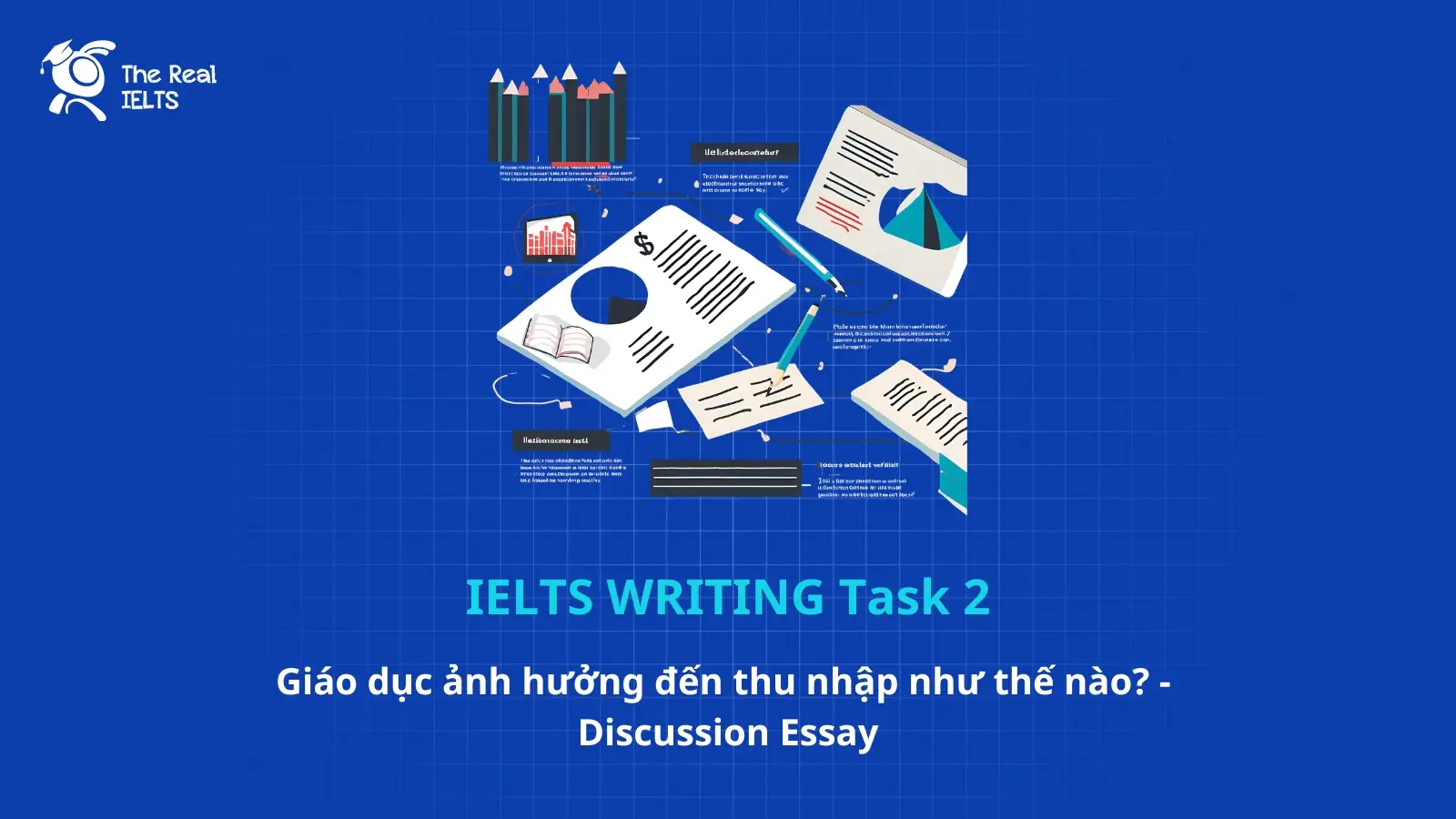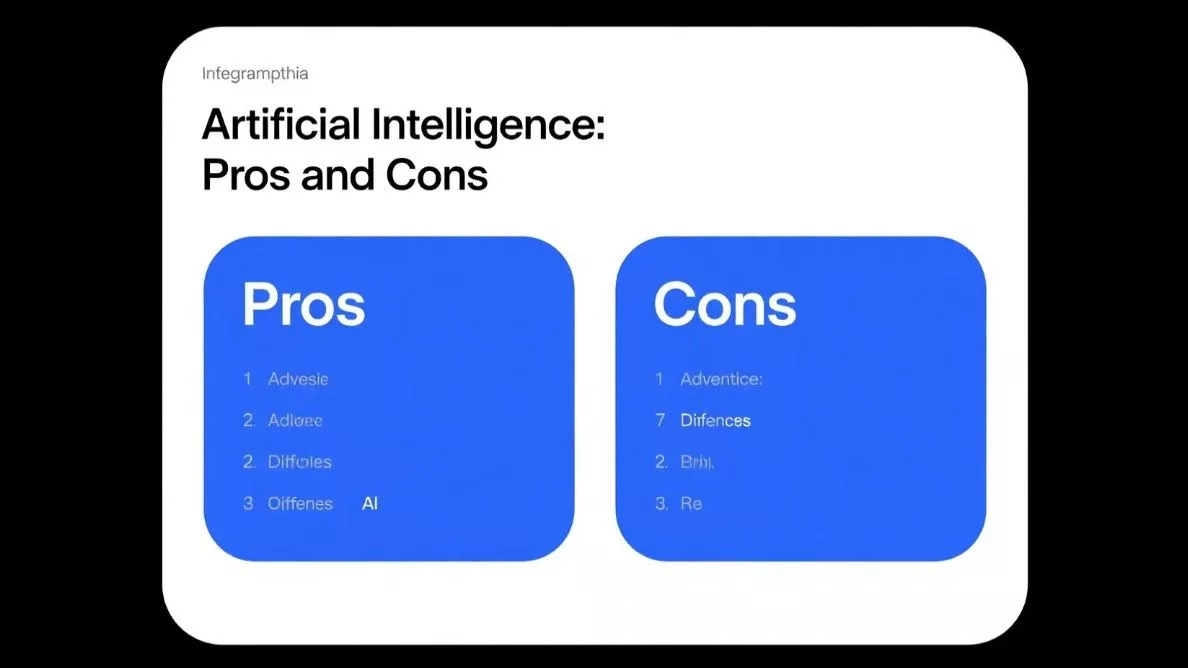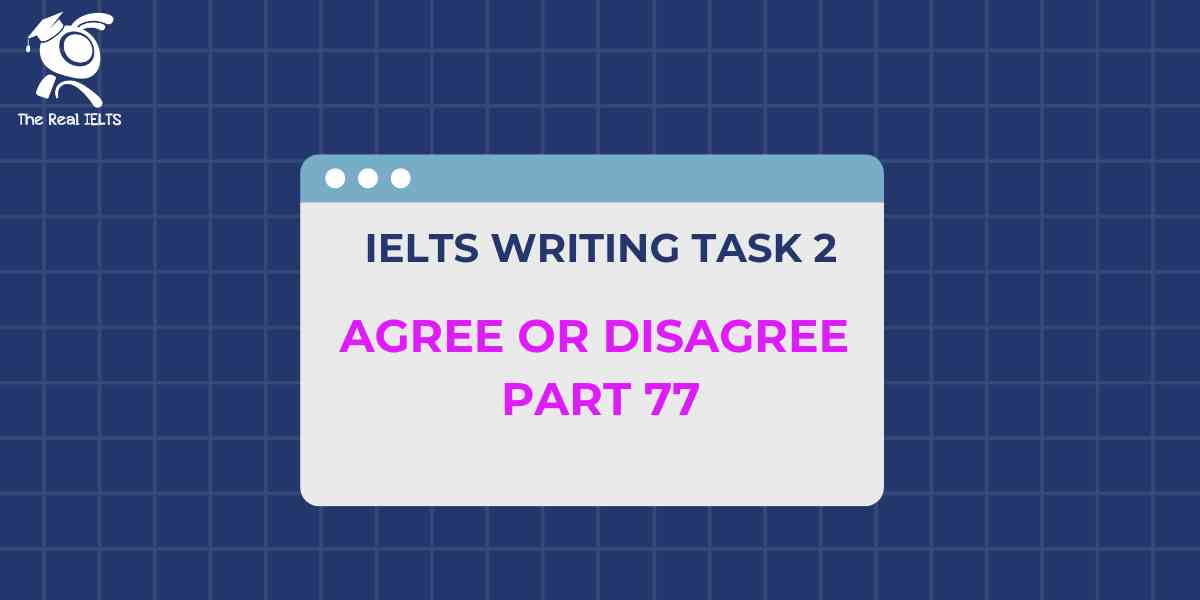Trong bài IELTS Writing Task 2 dạng Discussion Essay, thí sinh cần phân tích cả hai quan điểm trước khi đưa ra ý kiến cá nhân một cách thuyết phục. Giáo dục được cho là yếu tố quyết định thu nhập của mỗi cá nhân, nhưng một số người cho rằng kinh nghiệm và kỹ năng thực tế quan trọng hơn.
Đọc thêm: IELTS Writing Task 2: Giáo dục ảnh hưởng đến thu nhập như thế nào? – Agree or Disagree.
Đề bài IELTS Writing Task 2: Giáo dục ảnh hưởng đến thu nhập như thế nào? – Discussion Essay
Some people believe that education directly determines an individual’s income, while others argue that skills and experience play a more significant role. Discuss both views and give your own opinion.
Ví dụ 1
The relationship between education and income has long been debated. Some argue that education is the key factor in determining an individual’s earning potential, while others believe that practical skills and experience play a more significant role. This essay will examine both perspectives before presenting my own view.
The Role of Education in Determining Income
Proponents of the education-first perspective argue that formal education provides individuals with the necessary knowledge and qualifications to enter well-paying professions. Many high-income careers, such as medicine, law, and engineering, require university degrees or advanced certifications. Without these credentials, individuals may find it difficult to access lucrative job opportunities.
Additionally, research has shown a positive correlation between education level and earnings. University graduates, on average, earn significantly more than those without a degree. Employers often use educational qualifications as a screening tool, assuming that a higher level of education indicates greater intelligence, discipline, and problem-solving abilities.
The Importance of Skills and Experience
On the other hand, many argue that skills and experience are more important than formal education when it comes to financial success. A degree does not guarantee practical competence, and many graduates struggle to find well-paying jobs due to a lack of real-world experience. In contrast, individuals who acquire specialized skills through apprenticeships, vocational training, or hands-on experience can often secure well-paying jobs without a university education.
Entrepreneurial success further supports this view. Many wealthy business owners and self-made millionaires have little formal education but possess industry-specific expertise, creativity, and resilience. Skilled workers in trades such as plumbing, electrical work, and programming can also earn high incomes without traditional higher education.
My Opinion
While education provides a strong foundation for professional success, I believe that skills and experience ultimately play a more decisive role in determining an individual’s income. In today’s rapidly changing job market, employers increasingly value practical abilities, adaptability, and problem-solving skills over academic credentials. Therefore, a balanced approach that combines education with hands-on experience and continuous skill development is the best way to maximize earning potential.
Ví dụ 2
Education has traditionally been viewed as a key determinant of an individual’s earning potential. However, some argue that practical skills and experience are more crucial in shaping financial success. This essay will examine both perspectives before presenting my own opinion.
On the one hand, education is often seen as the foundation for higher income levels. Formal education provides individuals with specialized knowledge and qualifications that are essential for many high-paying professions. For instance, doctors, lawyers, and engineers must undergo years of academic training to enter their respective fields. Additionally, a university degree can enhance job prospects by making candidates more competitive in the job market. Many employers prioritize applicants with formal qualifications, assuming they possess a certain level of discipline, analytical ability, and theoretical expertise. Furthermore, statistics consistently show that degree holders, on average, earn higher salaries than those without tertiary education.
On the other hand, skills and experience can sometimes be more valuable than formal education. Many successful entrepreneurs, skilled tradespeople, and self-made professionals have achieved financial success without completing higher education. For example, individuals in fields such as programming, sales, and creative industries often rely more on their expertise and practical experience than on academic credentials. Moreover, the job market is constantly evolving, with new industries emerging that prioritize adaptability and real-world problem-solving skills over formal qualifications. Additionally, some careers reward hands-on experience more than theoretical knowledge; for instance, a highly skilled electrician or a seasoned digital marketer may earn more than a university graduate with no practical experience.
In my opinion, while education provides a strong foundation and enhances career opportunities, it is not the sole determinant of income. Skills, experience, and market demand play equally, if not more, significant roles in financial success. A balanced approach—combining formal education with practical expertise—offers the best prospects for a lucrative career.
Estimated Band Score: 8.0+
- Task Response: Clear and balanced discussion of both perspectives with a well-supported opinion.
- Coherence & Cohesion: Logical structure, smooth transitions.
- Lexical Resource: Strong vocabulary with precise word choices.
- Grammatical Range & Accuracy: Varied sentence structures with minimal errors.
Ví dụ 3
The relationship between education and income has been widely debated. Some argue that education is the primary determinant of an individual’s earnings, while others believe that skills and experience are more influential. This essay will examine both perspectives before presenting my own view.
Education as the Key Determinant of Income
Many believe that formal education is directly linked to income levels for several reasons:
- Higher Qualifications Lead to Better Jobs: Employers often require degrees for well-paying positions, particularly in fields such as medicine, law, and engineering.
- Access to Career Advancement: Higher education provides credentials that open doors to promotions and leadership roles.
- Higher Lifetime Earnings: Studies consistently show that university graduates earn more than those with only a high school diploma.
- Networking Opportunities: Universities provide valuable connections that can lead to high-income job opportunities.
Skills and Experience as More Important Factors
On the other hand, some argue that skills and experience are more crucial in determining income:
- Practical Skills Over Degrees: Many employers prioritize technical skills, problem-solving abilities, and hands-on experience over formal qualifications.
- Success Without Formal Education: Entrepreneurs like Steve Jobs and Elon Musk, who achieved great wealth without traditional degrees, highlight the importance of innovation and business acumen.
- Industry-Specific Requirements: In some industries, such as technology, skilled programmers and designers can secure high-paying jobs without university degrees.
- On-the-Job Learning: Many high-income professions value experience gained through apprenticeships, internships, or vocational training over academic credentials.
My Opinion
While education plays a significant role in shaping career prospects, it is not the sole determinant of income. A degree can provide advantages, but success also depends on practical skills, adaptability, networking, and real-world experience. In today’s fast-changing job market, a combination of education, skills, and experience is the best formula for financial success.
Conclusion
Both education and experience contribute to income levels, but neither is an absolute predictor of financial success. While a strong educational background can offer a competitive edge, individuals who continuously develop their skills and gain relevant experience can also achieve high earnings.
Ví dụ 4
The relationship between education and income is a widely debated topic. Some argue that education directly determines an individual’s earning potential, while others believe that skills and experience are more important factors. This essay will examine both perspectives before presenting my own view.
Education as a Key Determinant of Income
Supporters of the view that education determines income argue that:
- Higher Degrees Lead to Better Job Opportunities – Many high-paying professions, such as medicine, law, and engineering, require advanced education and credentials.
- Increased Knowledge and Expertise – Formal education provides individuals with specialized knowledge, critical thinking skills, and technical abilities that employers seek.
- Statistical Evidence – Studies indicate that those with higher education qualifications earn more on average than those with only a high school diploma.
Skills and Experience as More Important Factors
On the other hand, many believe that practical skills and work experience are more critical than formal education:
- Real-World Skills Matter More Than Degrees – Employers often prioritize problem-solving abilities, adaptability, and industry-specific skills over academic qualifications.
- Successful Individuals Without Degrees – Many entrepreneurs and professionals, such as Steve Jobs and Elon Musk, built successful careers without completing traditional higher education.
- Experience Enhances Earning Potential – In fields like business, technology, and skilled trades, hands-on experience and continuous learning can lead to higher salaries and career growth.
My Opinion
While education plays a significant role in shaping an individual’s income, it is not the sole determining factor. In my view, a combination of education, skills, and experience is the best approach to achieving financial success. Higher education can provide a strong foundation, but practical experience and adaptability are crucial in today’s dynamic job market.
Conclusion
Both education and experience contribute to income levels, but their importance varies by industry and career path. A degree may open doors, but long-term financial success often depends on skills, adaptability, and real-world experience.
Ví dụ 5
The relationship between education and income has been widely debated. Some argue that formal education is the key determinant of an individual’s earnings, while others believe that skills and experience play a more crucial role. This essay will explore both perspectives before presenting my own view.
Education as the Key Determinant of Income
Supporters of the view that education directly determines income argue that formal qualifications open doors to better-paying jobs. Many high-income careers, such as medicine, engineering, and law, require advanced degrees. Higher education provides specialized knowledge, critical thinking skills, and professional networking opportunities, all of which can lead to higher salaries. Additionally, statistical data from organizations like the OECD and the U.S. Bureau of Labor Statistics show that individuals with higher degrees generally earn more than those with lower educational qualifications.
Furthermore, education serves as a signaling mechanism for employers. A degree not only represents knowledge but also demonstrates qualities such as discipline, perseverance, and the ability to learn complex concepts. As a result, individuals with formal education often have access to better job opportunities and career advancement prospects.
Skills and Experience as More Significant Factors
On the other hand, many argue that skills and experience are more critical in determining income than formal education. In rapidly evolving industries such as technology, entrepreneurship, and the arts, practical expertise and adaptability often outweigh academic qualifications. For instance, many successful entrepreneurs, such as Steve Jobs and Elon Musk, achieved significant financial success without completing traditional degrees.
Additionally, hands-on experience and skills can lead to higher income even in fields where degrees are common. Professions such as skilled trades (e.g., electricians, plumbers, and mechanics) often pay well without requiring a university education. Employers frequently prioritize problem-solving abilities, creativity, and technical expertise over formal degrees, particularly in industries driven by innovation and performance.
Personal Opinion
While both education and skills play a role in determining income, I believe that a combination of the two is the most important factor. Education provides a strong foundation and access to opportunities, but practical skills and experience determine long-term career success. In today’s dynamic job market, individuals who continuously learn, adapt, and gain relevant experience are more likely to achieve financial stability, regardless of their formal educational background.
Conclusion
In conclusion, education can significantly influence income by providing knowledge and credentials, but it is not the sole determinant. Skills, experience, and industry demand also play crucial roles in shaping an individual’s earning potential. A balanced approach that combines education with continuous skill development is the most effective path to financial success.
Ví dụ 6
The link between education and income is a widely debated topic. Some argue that formal education directly determines an individual’s earning potential, while others believe that skills, experience, and practical expertise play a more significant role. This essay will explore both perspectives before presenting a balanced opinion.
Education as the Key to Higher Income
Supporters of this view argue that formal education provides the necessary qualifications and knowledge for high-paying jobs. Many professional careers, such as medicine, law, and engineering, require a university degree as a basic entry requirement. Additionally, higher education can lead to better job stability and career progression. Studies consistently show that, on average, individuals with higher education degrees earn more over their lifetime than those without.
Moreover, higher education fosters critical thinking, communication, and problem-solving skills, which are highly valued in the job market. Many employers prioritize degree holders because formal education is often seen as a measure of competence and discipline.
Skills and Experience as More Important Factors
On the other hand, some argue that income is not solely determined by education but rather by an individual’s skills, experience, and adaptability. Many high-earning professionals, such as entrepreneurs, software developers, and skilled tradespeople, have achieved financial success without formal higher education. For example, self-made billionaires like Steve Jobs and Elon Musk emphasize the importance of practical skills and innovation over degrees.
Furthermore, experience and hands-on learning often outweigh theoretical knowledge. In fast-evolving industries like technology, digital marketing, and entertainment, practical expertise and the ability to adapt to change can be more valuable than a traditional education. Employers often prioritize candidates with strong problem-solving abilities and relevant work experience over formal qualifications.
Personal Opinion
While higher education can provide a strong foundation for career success, it is not the sole determinant of income. The combination of education, skills, and experience is what ultimately determines an individual’s earning potential. A degree can open doors, but practical knowledge, adaptability, and networking are equally important. In today’s dynamic job market, continuous learning and skill development—whether through formal education, vocational training, or self-learning—are crucial for financial success.
Conclusion
Both education and skills/experience play essential roles in determining an individual’s income. While a degree can provide an initial advantage, long-term financial success often depends on practical expertise, experience, and adaptability. Therefore, a balanced approach that values both formal education and continuous skill development is the most effective strategy for career growth and higher income.
Ví dụ 7
People have different perspectives on whether education directly determines income or if skills and experience play a more significant role. While formal education can provide better career opportunities, others argue that practical expertise and experience are more important in securing financial success.
On the one hand, education is often seen as a key factor in determining income levels. A university degree provides specialized knowledge, qualifications, and access to well-paying jobs in fields like medicine, law, and engineering. Additionally, higher education helps individuals develop critical thinking, problem-solving abilities, and networking opportunities, all of which contribute to career advancement. Many studies indicate that, on average, degree holders earn more than those without formal education.
On the other hand, skills and experience are equally, if not more, important in determining income. Some professions, such as trades (plumbing, carpentry, and electrical work), offer high salaries without requiring a university degree. Moreover, practical skills in areas like technology, entrepreneurship, and freelancing allow individuals to earn substantial incomes regardless of formal education. Many successful entrepreneurs and professionals have built wealth through hands-on experience, adaptability, and industry-specific skills rather than academic credentials.
In my opinion, while education can provide a strong foundation, it is not the sole determinant of income. Skills, experience, and industry demand play a crucial role in financial success. Therefore, individuals should focus on both acquiring knowledge and developing practical expertise to maximize their earning potential.
Ví dụ 8
Some people believe that formal education is the primary factor in determining an individual’s income, as higher qualifications often lead to better job opportunities. Others argue that skills and experience play a more crucial role in financial success. This essay will examine both perspectives before presenting my own view.
On the one hand, higher education is often associated with higher earning potential. Many well-paying professions, such as medicine, law, and engineering, require formal degrees. Employers tend to prefer candidates with academic qualifications, as they demonstrate expertise, discipline, and commitment. Additionally, university graduates typically have access to better job networks and career opportunities, which can significantly impact their income levels. Studies have shown that individuals with higher degrees generally earn more than those with only secondary education.
On the other hand, skills and experience can be equally, if not more, important than formal education. Many successful individuals, such as entrepreneurs and skilled workers, have achieved high incomes without university degrees. Fields like technology, trades, and creative industries often prioritize practical skills over academic qualifications. For example, self-taught programmers and experienced technicians can earn competitive salaries based on their expertise rather than their educational background. Furthermore, work experience allows individuals to develop problem-solving abilities and industry-specific knowledge, which are highly valued by employers.
In my opinion, while education provides a strong foundation, skills and experience ultimately determine long-term earning potential. A degree may help secure an initial job, but practical expertise, adaptability, and continuous learning are essential for sustained financial success. Therefore, individuals should focus not only on formal education but also on gaining relevant skills and real-world experience to maximize their income opportunities.
Ví dụ 9
Some people argue that education is the key factor in determining an individual’s income, as it provides the necessary qualifications and knowledge for high-paying jobs. Others believe that practical skills and work experience have a greater impact on earnings. This essay will examine both perspectives before presenting my own view.
On the one hand, formal education is often seen as essential for securing well-paying jobs. Many professions, such as medicine, law, and engineering, require advanced degrees, which typically lead to higher salaries. Additionally, individuals with higher education qualifications are more likely to be employed in prestigious positions, as companies prioritize candidates with academic credentials. Furthermore, statistical evidence shows that university graduates tend to earn more over their lifetime compared to those without a degree. This suggests that education significantly influences an individual’s financial success.
On the other hand, skills and experience are equally, if not more, important in determining income. Many successful entrepreneurs and self-made professionals, such as Bill Gates and Elon Musk, achieved financial success through expertise and experience rather than formal education. In industries like technology, business, and skilled trades, practical abilities often outweigh academic qualifications. For instance, software developers, electricians, and digital marketers can earn substantial salaries without a university degree, provided they possess strong technical skills and hands-on experience. Moreover, some graduates struggle to find well-paying jobs due to market saturation, highlighting the limitations of relying solely on education.
In my opinion, while education provides a foundation for higher earnings, it is not the sole determining factor. Skills and experience play a crucial role, particularly in fields that prioritize practical expertise. Therefore, a combination of education, skills, and experience is the most effective way to achieve financial success.














